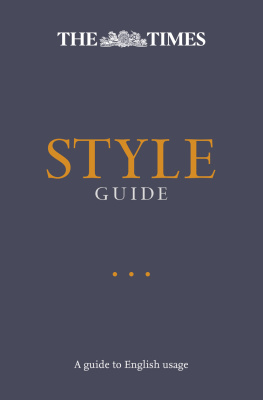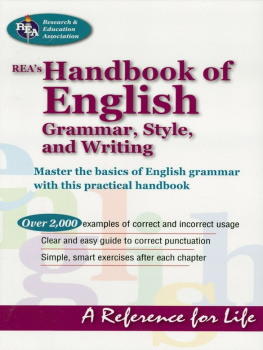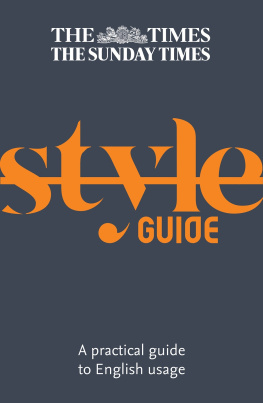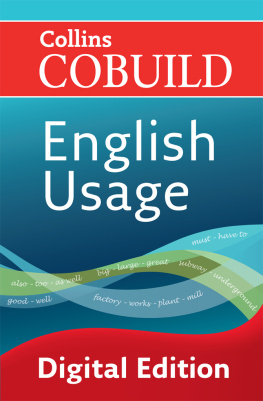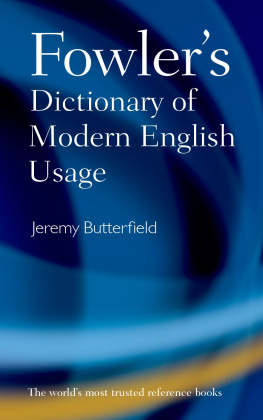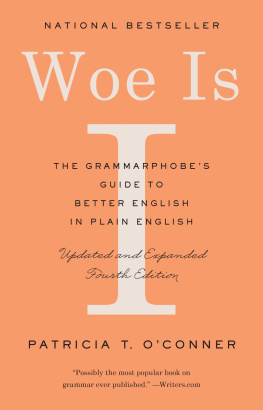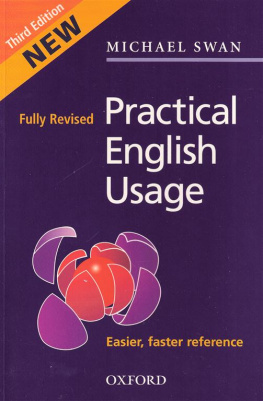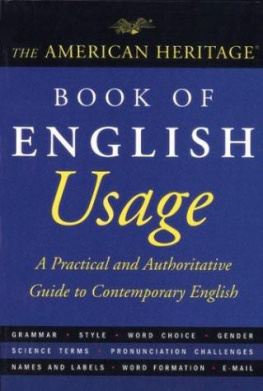Special thanks to Isabella Bengoechea, Magnus Cohen, Fiona Gorman, Alan Kay, Matthew Lyons and Siobhan Murphy, who worked on production of the book at The Times, and to Gerry Breslin, Jethro Lennox, Kevin Robbins and Sarah Woods at HarperCollins.
Thanks also to Nic Andrews, Chris Broadhurst, Josie Eve, Hannah Fletcher, Jeremy Griffin, Robert Hands, Oliver Kamm, Nick Mays, Robbie Millen, John Price, Chris Roberts, Fay Schlesinger, Mark Shillam, Craig Tregurtha, Emma Tucker, Roland Watson, Rose Wild and John Witherow at The Times; and to Tim Austin, Richard Dixon, Sir Simon Jenkins and the late Philip Howard, who were responsible for earlier editions of this guide.
a, an use a before all words beginning with a vowel or diphthong with the sound of u (as in unit) a eulogy, a European etc; but use an before unaspirated h an heir, an honest woman, an honour. Whether or not to use an before an aspirated h when the first syllable of a word is unaccented hotel, historian, heroic is a matter of preference; The Times prefers a. With abbreviations, acronyms, initials, be guided by pronunciation: an LSE student, an RAF officer, an NGO
abbreviated negatives (cant, dont, shant etc, and similar abbreviations/contractions such as Ill, youre) should be discouraged except in direct quotes, although in more informal pieces such as diaries, sketches and some features they are fine when the full form would sound pedantic
Abdication cap with specific reference to Edward VIIIs; in general sense use lower case
Aboriginal (singular, noun and adjective) and Aborigines (plural), for native Australian(s); aboriginal (lower case) for the wider adjectival use
absorption is the noun from absorb; absorbtion is a non-word that has found its way more than once into The Times
abstraction often an escape from precise meaning and a sign of lazy writing. Beware words such as situation, crisis, problem, resolution, question, issue, condition . A newspaper is about what happens and what people do; it should use concrete words. A headline, especially, may be killed by an abstract noun or phrase
abu means father of so must not be separated from the name that follows, ie Abu Qatada at first mention remains Abu Qatada (father of Qatada), not simply Qatada, and certainly not Mr Qatada
accents give French and German words their proper accents and diacritical marks, unless they have passed into common English usage. Use accents as appropriate also on capital letters and in headlines. With anglicised foreign words, no need for accents ( hotel, depot, debacle, elite, regime etc), unless it makes a crucial difference to pronunciation or understanding, eg clich, faade, caf, expos. NB matinee, puree etc.
In Spanish give accents only on the names of people, if they can be checked. In other Spanish words and place names, ignore accents and diacritical marks except for n with the tilde (or, as in El Nio); this is considered a distinct letter of the alphabet in its own right and is also familiar to (and easily pronounceable by) most English-speaking readers
Achilles heel a small but deadly area of weakness in someone seemingly invulnerable (like the Greek hero of the Trojan war, hence cap and apostrophe); but achilles tendon (lower case, no apostrophe, as the connection with the myth is more remote)
acknowledgment as with most (but not quite all) such words, no middle e
acronym a word formed from the initial letters or groups of letters of words in a set phrase or series of words, eg Opec, from the Organisation of Petroleum Exporting Countries, or Ukip for the United Kingdom Independence Party. If the acronym is easily pronounced and usually spoken as a word, write with an initial cap and then lower case: Opec, Nato, Ukip, Rada, Bafta, Nice, Acas, Asbo etc; follow this house style whatever the organisation itself may choose to do. Acronyms do not normally take the definite article.
Non-acronym abbreviations based on initials that are spelt out separately in speech (ie not pronounced as a word) remain in caps, and normally retain a definite article: the BBC, the RAF, the CBI, the LSO, the UN, the EU etc. A few, by convention, take an unpleasant mixture of upper and lower case: MoT, the MoD, the DfE, the IoD. All but the most familiar organisations, bodies, concepts and things should be named in full at first mention with the initials in brackets. However, a lot of initials in text will produce an unappetising alphabet soup, so use as sparingly as possible; after first mention try to vary with a suitable word: the ministry, the corporation, the department, the institute etc
Act theatre, ballet, opera etc, use cap and use roman numerals when naming, specifying or giving references: Macbeth, Act I, Act II etc; for more general refs use lower case, eg in the second act of the play, in the third scene of Act II
Act and Bill (parliamentary) cap when giving full name (the Data Protection Act, the Assisted Dying for the Terminally Ill Bill etc) but otherwise lower case: a bill intended to decriminalise assisted suicide; the act covers the gathering, storing and processing of personal information etc
action as a transitive verb meaning undertake (The marketing department will action this) is corporate jargon of the most irritating kind; avoid
active verbs generally better (and shorter) than passive
actor, actress for women use the feminine designation
AD, BC note that AD comes before the date, eg AD35; BC comes after, 350BC. Both have no spaces. With century, both are used after, eg 3rd century BC/AD. The terms BCE and CE (Common Era) are not to be used by Times writers but may exceptionally be allowed to a guest columnist/letter writer if context/courtesy seems to demand it (eg Lord Sacks, as chief rabbi, preferred CE in his Credo columns)
addresses no commas in 1 Pennington Street, 3 Thomas More Square, 1 London Bridge Street etc; and do not abbreviate. No commas either between county names and postcodes, eg West Sussex BN6 9GS
adjectives do not overuse, especially in news reporting. Ask if the adjective is necessary and what it adds. Try to use adjectives to add precision, not merely for colour or emphasis. Beware especially those adjectives that come unbidden to mind with particular nouns: serious danger, devout Catholic, staunch Protestant, blithering idiot
administration (US) now lower case (cf government) even when specific, eg the Trump administration; generic always lower case, eg a lame-duck administration; also lower case adjectival, eg an administration official
Admiral do not abbreviate to Adm Jones etc except in lists; upper case when used as a title (Admiral Jones), at subsequent mentions the admiral
ad nauseam not ad nauseum
adrenaline with the final e
advance notice is faintly tautologous, but probably defensible; advanced notice is just wrong
adverbs as with adjectives (only more so), do not overuse, and never use without thought. Ask what, if anything, is being added or changed. Consider if there might be a better way of achieving the same effect, eg by using a more vivid or dramatic verb: to rush or race, say, rather than to run fast.
Adverbs are rarely a good way of beginning a sentence. Interestingly, ironically, oddly all clumsily flag something that ought to become obvious to the reader soon enough.
When adverbs are used to qualify adjectives the joining hyphen is rarely needed, eg heavily pregnant, classically carved, colourfully decorated. In some cases, however, such as well founded, ill educated, when used before the noun, eg a well-founded rumour, write the compound with the hyphen. The best guidance is to use the hyphen in these phrases as little as possible or when the phrase would otherwise be ambiguous. Thus, the island is well regulated, but it is a well-regulated island
Next page
